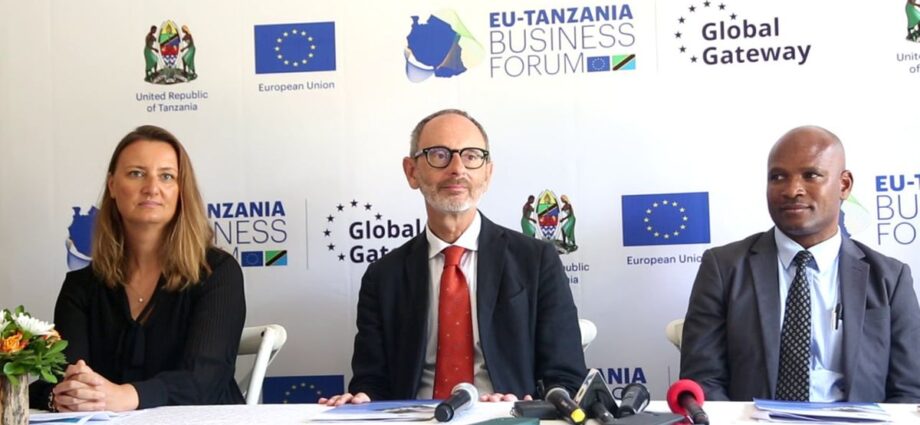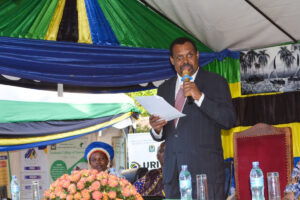One thing that Tanzania has going for it is its fairly diversified economy. When Covid-19 was ravaging the global economy and destroying tourism-dependent countries, mining (particularly gold mining) kept Tanzania’s balance of payments and the shilling buoyant.
Three years prior, when gold exports dropped dramatically, tourism kept the economy and the shilling afloat. Not to mention the agriculture and manufacturing potential that Tanzania has, given its strategic location on the continent as a gateway to the East and Central Africa regions.
In its semi-annual economic update published this month, the World Bank reported Tanzania to be performing better than its regional peers in almost every metric. Both the pandemic and the conflict in Ukraine have had negative consequences for inflation and agricultural inputs.
But Tanzania’s inflation is well below its regional peers. The relatively stable exchange rate likely mitigated the impact of adverse global trends on domestic inflation. The better news is that according to last year’s World Bank Report, even manufacturing exports are on an upward trajectory (32.3% growth during the first three quarters of 2021), reflecting Tanzania’s improving relations with EAC member states and other regional neighbours.
While it is safe to say that Tanzania’s economy has vast potential left, two metrics remain stubbornly concerning. One is the minimal decline in poverty rates, which have hovered around 26%–27% for a very long time. While economic growth is important, prosperity should also be shared, and there is quite a bit Tanzania can do about it.
The other is the relative decline in the levels of Foreign Direct Investment (FDI) in absolute terms since 2015. On the second item, I would like to turn my attention to the trade and investment relations between the European Union and Tanzania.
The European Union has been a historically strong economic partner for Tanzania. In a report issued last year, 12% of Tanzania’s imports originated from EU states, while 10% of its exports went the other way. The EU’s consolidated contribution to overseas development in Tanzania stood at a significant 27%. In addition to that, there are significant EU investments in agriculture (particularly in Arusha) as well as tourism. Data suggests that EU investors’ focus seems to be long-term, given the industries they tend to invest in.
In the EU-Tanzania business forum kicking off this week, delegates, leaders, policymakers, and businesses will be keen to explore the potential for deepening business relations between the two parties. This is welcome news for Tanzania as it seeks to attract FDI with the view of fostering shared prosperity.
The EU-Tanzania Business Forum kicks off at a time when the EU is stepping up its offer to its partners with major investments in infrastructure development around the world. Between 2021 and 2027, EU institutions and EU Member States jointly are expected to mobilise up to €300 billion of investments in a range of sectors, including digital, climate and energy, transport, health, as well as education and research.
But it is not just about European FDI; it is also about how Tanzania can benefit, trade-wise, from linking with European businesses. But for us to make that happen, I think two things must happen.
Make fiscal policy stable and predictable
The first is to make fiscal stability stable and predictable. In a report issued less than a year ago, EU businesses were asked about their key challenges in working and investing in Tanzania. You may have guessed that “tax policy and administration” was the number one issue, with 94% of the surveyed firms saying it was their primary bottleneck.
Fiscal policy, particularly tax policy, is always a balancing act. With an economy like Tanzania, where half of it is informal, conventional measures simply won’t cut it. The measures must incentivise formalisation while raising enough revenues to keep the exchequer afloat.
There has been progress in making tax paying easy with the use of technology in recent years, with technology implementation effectively transforming tax paying in Tanzania, albeit with some glitches along the way.
If there are any improvements from a procedural perspective, they would be around the capacity of the TRA’s network and the challenges that come with the system being overloaded, but Tanzania is heading in the right direction.
From a taxpayer engagement perspective, we are beginning to see some deliberate efforts to include us in the debate. In January of this year, there was a national tax dialogue led by the Minister of Finance to discuss challenges around paying taxes.
Initiatives like these will go a long way to foster voluntary compliance and also enrich the quality of legislation coming through our parliament.
However, from a policy perspective, there are some salient points to address. The majority of the investment coming from the EU will be cross-country, and we currently do not have many double taxation agreements with European countries.
In addition, there are specific change of control provisions that make offshore investments and disposals tricky. This certainly has to be looked at given the declining FDI trend since 2015.
Connected to policy, though not fiscal, is the need to make regulators “facilitators” rather than “frustrators” of businesses. This is where a well-coordinated Tanzania Investment Centre (TIC), Business Registration and Licensing Authority (BRELA), Fair Competition Commission (FCC), and other regulatory bodies must come in. The mindset must be that of facilitation as opposed to just being a watchdog.
Execute urgently, knowing that opportunities have expiration dates
Having resources and potential is fantastic, but the game changer is how quickly one executes to tap into those resources. With the world and its technology changing so fast, it is important to know that resources will not be relevant forever.
At the moment, three projects will have a significant impact on FDI flows into Tanzania. The EACOP project, the LNG project, and the Kabanga Nickel Project All of the projects have their financing linked to European entities or parent companies. The key message here is that these big projects require timely execution to get off the ground. The changing geopolitical demands, including climate politics, may mean that if there is a significant delay in getting the investment in place, the projects may not pick up, resulting in an incredible loss of transformative economic potential.
Shakespeare’s words appear to be apt at this juncture in Tanzania’s development history: “There is a tide in the affairs of men.” which, taken at the flood, leads on to fortune.” The tide seems to be right for Tanzania to cease its investment potential.
There has to be a sense of urgency in the execution of some of these major projects. Indeed, there has to be a sense of urgency broadly, whether that is with a TRA official getting clearances or finalising audits as quickly as possible or a traffic police working hard to ensure the road is clear for cargo to make its way.
The European Union offers a fantastic opportunity for Tanzania. Our history with European investment means that these waters are not uncharted. In particular, there appears to be political will behind the EU Global Gateway package.
The investment package is geared towards the priorities identified through the engagement between the EU and Africa, within the context of the Africa Agenda 2060, and jointly identified through close dialogue with the African Union Commission, African partners’ countries, as well as regional economic organisations.
Perhaps the most promising aspect of the package is the support for strengthening Africa’s economic integration process toward the African vision of the AfCFTA as a single continental trade and investment system that is stable, solid, and based on clear regulatory frameworks.
According to the European Union, as part of the package, the EU has announced an additional €630 million to continue such support, including the operationalisation of the TEI Technical Assistance Facility for the AfCFTA, a €24.2 million action co-funded by France, Germany, and Sweden.
The fact that continental integration is central to this package means that the development will be self-sustaining. For a very long time, analyst have bemoaned the lack of intra-African trade as one of the chief reasons Africa remained poor and disconnected from itself.
To summarise my thoughts, I have argued that Tanzania’s economy is uniquely endowed with the kind of potential and diversity that make it very attractive for investors, not just from Europe but from the rest of the world.
This potential, however, requires a predictable and stable policy and fiscal framework that will make the country much more competitive than the rest of its regional peers and neighbours. In addition to that, a sense of urgency needs to be injected in order to drive such investment. In that sense, Europe is an exciting source of investment and cooperation.
We just need to intensify the economic cooperation for us to be able to attract not just investment but also markets to that part of the world.
Samwel Ndandala is an Associate Director with Deloitte Consulting Limited. The views presented are his own and not necessarily those of Deloitte. He can be reached at [email protected]















